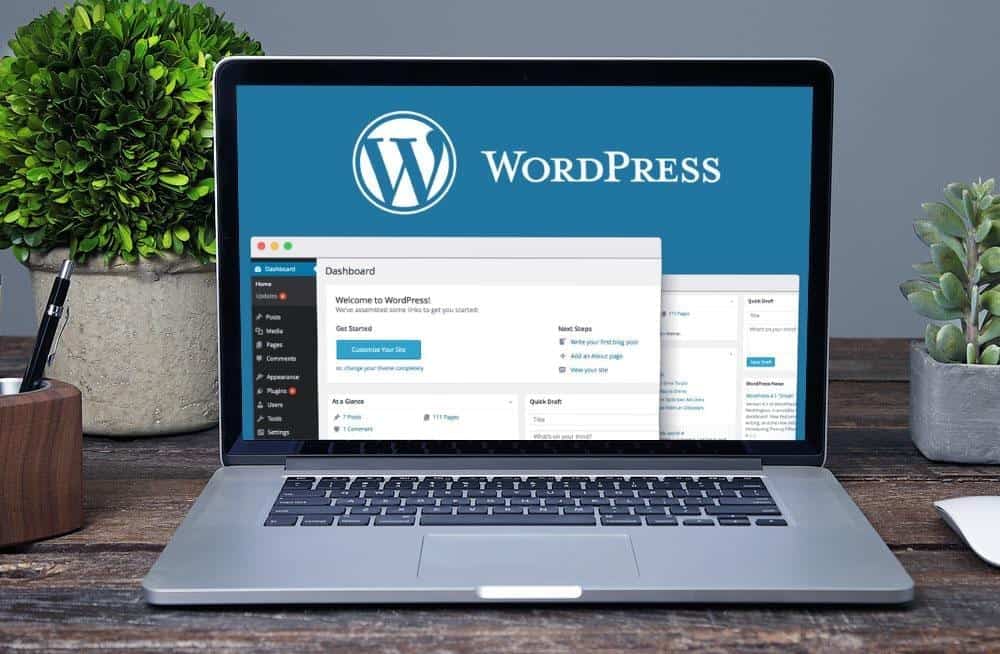
When thinking of establishing your business online, one of the first and most important decisions to make is selecting a content management system (CMS).
The CMS enables you to manage and organize your website. It handles a lot of the technicalities that come with website design, so even those that are not familiar with website language can use them.
There is a wide variety of CMSs available on the market. You will find some systems are ideal for e-commerce while others are more suited to informative websites.
So, which one is right for your small business? This really depends on the aim of your website and the functionalities you need. Let’s explore this in more detail.
CMS for an Informative Website
Looking to get your small business out into the online market? An informative website can be the best route to do this, as it will allow you to provide information about your solutions to visitors—a great tool for generating leads and developing an interest in your business.
WordPress

WordPress has established itself as one of the most popular CMSs in the market. Approximately 27% of the websites on the internet use WordPress, which translates to about 75 million websites.
The reason why it is so popular is due to the platform’s easy to use interface and the tons of tools it offers users.
If you aren’t familiar with website design or language, there’s no need to worry. WordPress has pre-designed themes you can use for this; and if you’re prefer something more professional, then the paid premium themes are very affordable.
WordPress also takes care of all the language needed for design, posting content, images, and so on. For those that are familiar with web design, the platform is open source so you’ll always have the option to customize the design and functionalities of your chosen theme.
Learning how to set up your own website needn’t be a difficult process, especially with WordPress’ user-friendly features. It also allows you to integrate a blog so you can ramp up your SEO, and even upgrade your informative website into an e-commerce site since WordPress integrates very well with WooCommerce.
The business plan for WordPress starts at $25 per month, which comes with unlimited storage and complete access to their themes.
Squarespace
While Squarespace started out around the same time as WordPress, it isn’t an open source platform, meaning that it isn’t as customizable as WordPress and it uses its own hosting services, restricting your independence.
Like WordPress, however, Squarespace makes it easy for beginners to create a website. It also comes with themes that can be used for those that are not familiar with web design.
There is an element of customization, though, in that it does allow users to upload their own design. You also have the option to integrate e-commerce through plug-ins on the platform.
The business packages for the platform starts at $18 per month and even gives credits for Google AdWords.
CMS for e-commerce Websites
An e-commerce website can host your product/service information and full integration for a smooth payment, shipping, and checkout experience, allowing your business to compete with bigger brands.
In fact, many small businesses tend to start off online without a brick and mortar space as it is more convenient and less costly.
Shopify

Launching an e-commerce site with Shopify is a highly popular choice since it’s an easy to use platform that provides a small business with all the e-commerce solutions that it’d need. It comes with pre-designed themes that are known to enhance user experience and provide a rich interface.
Think of Shopify as more than just an e-commerce solution, as it has the capability to integrate with various apps that provide enhanced security, blogs, and other functionalities.
Mobile responsiveness is important as over half of the Internet traffic comes from mobile devices. Shopify ensures all its themes are optimized for mobiles and so visitors should have no issues when accessing Shopify-based websites from mobile devices.
As a payment gateway, Shopify offers users its own gateway. It comes with a management tool that allows you to keep track of all transactions. However, for those that prefer using third-party gateways, the platform is compatible with PayPal, Stripe, Amazon Pay, and many more.
WooCommerce
Since WooCommerce can be integrated with WordPress, it is one of the most popular e-commerce platforms. It comes with pre-designed templates for the store with the option to add hundreds of products and services.
No matter what type of product you want to sell—digital, physical, or subscriptions—the platform can facilitate this.
The fact that WooCommerce is an open source platform gives users further options. For developers and those that have technical knowledge, custom themes and functionalities can be added to the website.
To understand how your website fairs, you can even add a Google Analytics extension to help analyze your website.
As far as payment goes, the platform works with over 100 payment gateways. So whether you want PayPal or a different merchant integration, you can easily integrate it with WooCommerce.
Final thoughts
Think of a CMS like the foundations of your home. The foundation determines the strength and durability of your home; the CMS does the same for websites, which is why it is vital for your website’s survival that you opt for a platform that not only establishes your small business presence online but grows with your business.
After all, the majority of small businesses tend to aspire to grow, and the four platforms above are well-established and popular enough for such growth to become a reality.
Related Topics
- Best Web Hosting
- Best WordPress Hosting
- How to Build a Shopify Store
- Best eCommerce Software
- Online Stores in Nigeria
The post Best Content Management System to choose for your Small Business Website appeared first on Nigeria Technology Guide.
* This article was originally published here
